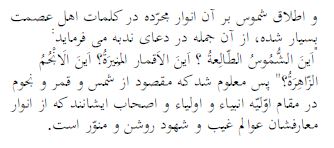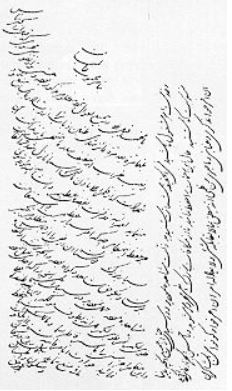Kitāb-i īqān ms. in hand of `Abd al-Baha'
كتاب ايقان
Exegetical Notes on the Kitāb-i īqān (Book of Certitude) : Studies and Notes on Themes, Texts and motifs in the Kitab-i iqan Pt. I.
Stephen N. Lambden
In progress 1970s-2015.
The Basmala and Colophon of the Kitāb-i īqān
The Babi Basmala of the Kitab-i iqan :
بسم ربنا الاعلي الاعلى
In the Name of Our Lord (Rabb), the Exalted (al-`aliyy [`Ali]) the Most High (al-a`la).

Above is the translation of the Babi type basmala oath which opens the Kitab-i iqan. Instead of the standard Qur'anic, Islamic Bismillah, "In the Name of God" (Allah) we have Bis'mi Rabbina,"In the Name of Our Lord". The word rabb "Lord" here, apart from indicating the Godhead (cf. Allah), might allude to the Bab as "Lord". Various Babi believers referred to the Bab as [Hadrat-i] Rabb-i A`la (or al-Rabb al-A`la), 'His Holiness Our Lord, the Most Elevated'. This is related to the fact that the abjad value of rabb (Lord) is 202 (r=200 + b = 2 = 202) which corresponds to the name of the Bab `Ali Muhammad (=`+l+y+m+h+m+d = 70+30+10+40+8+40+4 = 202).
The use of two forms of the Arabic root `+l+y (= `to elevate, be exalted, etc) then, seems to make sense as an allusion to the first component of name of the Bab `Ali [Muhammad] Shirazi, a name which corresponds to the name of the first twelver Imam, `Ali ibn Abi Talib (d. 40/661). That Baha'u'llah uses an Attribute of God `Aliyy/`Ali then its superlative also echoes the pattern set out by the Bab in his Arabic and Persian Bayans and elsewhere. In his new neo- but post-qur'anic basmala he utilized two Arabic superlatives as Divine Attributes indicative of the transcendent unknowability of God :
بسم الله الامنع الاقدس
That which constitutes this [initial] verse (al-āyat) [of the Bayan, stands] in [replacement of] the basmala [namely]
Bism Allāh al-amna` al-aqdas
"In the Name of God, the Most Inaccessible, the Most Holy".
This is how Persian Bayan III:11 commences. It is followed in many other major and minor writings of the Bab. In many of his later writings Baha'u'llah replaced this by,
بسم الله البهي الابهى
In the Name of God, the Glorious, the All-Glorious.
There was not a standard Babi or Baha'i basmala formula utilized all the time by either the Bab or Baha'u'llah. In essence the basmala which heads the Kitab-i iqan seems to allude to the elevated status of the Bab.
The prescript citation.
No man shall attain the shores of the ocean of true understanding except he be detached from all that is in heaven and on earth. Sanctify your souls, O ye peoples of the world, that haply ye may attain that station which God hath destined for you and enter thus the tabernacle which, according to the dispensations of Providence, hath been raised in the firmament of the Bayán.
The interpretation of these words of the Bab by Baha'u'llah reads as follows in the translation of Shoghi Effendi :
"The essence of these words is this: they that tread the path of faith, they that thirst for the wine of certitude, must cleanse themselves of all that is earthly—their ears from idle talk, their minds from vain imaginings, their hearts from worldly affections, their eyes from that which perisheth. They should put their trust in God, and, holding fast unto Him, follow in His way. Then will they be made worthy of the effulgent glories of the sun of divine knowledge and understanding, and become the recipients of a grace that is infinite and unseen, inasmuch as man can never hope to attain unto the knowledge of the All-Glorious, can never quaff from the stream of divine knowledge 4 and wisdom, can never enter the abode of immortality, nor partake of the cup of divine nearness and favour, unless and until he ceases to regard the words and deeds of mortal men as a standard for the true understanding and recognition of God and His Prophets. "
The Rejection of the pre-Islamic Prophets.
Noah
7 Among the Prophets was Noah. For nine hundred and fifty years He prayerfully exhorted His people and summoned them to the haven of security and peace. None, however, heeded His call. Each day they inflicted on His blessed person such pain and suffering that no one believed He could survive. How frequently they denied Him, how malevolently they hinted their suspicion against Him! Thus it hath been revealed: “And as often as a company of His people passed by Him, they derided Him. To them He said: ‘Though ye scoff at us now, we will scoff at you hereafter even as ye scoff at us. In the end ye shall know.’” 3 Long afterward, He several times promised victory to His companions and fixed the hour thereof. But when the hour struck, the divine promise was not fulfilled. This caused a few among the small number of His followers to turn away from Him, and to this testify the records of the best-known books. These you must certainly have perused; if not, undoubtedly you will. Finally, as stated in books and 8 traditions, there remained with Him only forty or seventy-two of His followers. At last from the depth of His being He cried aloud: “Lord! Leave not upon the land a single dweller from among the unbelievers.” 4
- The Age and the Chronology of the Mission of Noah
- The Ark of Noah and its inmates.
The pre-Islamic Arabian Prophets
Hud
"9 And after Noah the light of the countenance of Húd shone forth above the horizon of creation. For well-nigh seven hundred years, according to the sayings of men, He exhorted the people to turn their faces and draw nearer unto the Riḍván of the divine presence. What showers of afflictions rained upon Him, until at last His adjurations bore the fruit of increased rebelliousness, and His assiduous endeavours resulted in the wilful blindness of His people. “And their unbelief shall only increase for the unbelievers their own perdition.” 6
Salih
"And after Him there appeared from the Riḍván of the Eternal, the Invisible, the holy person of Ṣáliḥ, Who again summoned the people to the river of everlasting life. For over a hundred years He admonished them to hold fast unto the commandments of God and eschew that which is forbidden. His admonitions, however, yielded no fruit, and His pleading proved of no avail. Several times He retired and lived in seclusion. All this, although that eternal Beauty was summoning 10 the people to no other than the city of God. Even as it is revealed: “And unto the tribe of Thámúd We sent their brother Ṣáliḥ. ‘O my people,’ said He, ‘Worship God, ye have none other God beside Him….’ They made reply: ‘O Ṣáliḥ, our hopes were fixed on thee until now; forbiddest thou us to worship that which our fathers worshipped? Truly we misdoubt that whereunto thou callest us as suspicious.’” 7 All this proved fruitless, until at last there went up a great cry, and all fell into utter perdition. "
The Abrahamic Prophets
Abraham
Moses
David
Jesus = `Īsā عِيسَى is referred to in the Qur'an as a Rasul (Messenger [ of God]) and Nabi (Prophet figure) and a Mursal (`Sent Messenger'). His name in Hebrew-Aramaic is Yeshū[a], a late form of the name Joshua, meaning `YHWH [God] saves’; cf. Gk. Ieÿsous). This has become simplified in English to Jesus while the Arabic. Qur'anic spelling remains enigmatic.
Born around (c.‑ 6?‑ c.30 CE?)Jesus was the 1st cent. CE founder of that Jewish faction which became Christianity. He has a prominent, elevated place in the Q. (x 93 times in 15 sūras). As the "son of Mary" (Q. x 33) he allegedly spoke from the cradle (Q. 3:41; 5:109;19:30). Jesus both affirmed the Torah and received the Injīl (evangelion = Gospel[s]) from God (Q. 3:43f). Not literally "a son of God" or a deity consubstantial with God (Q. 9:30f; 5:19f; 43:59), Jesus is said to be al‑masīḥ (the messiah, Q x11), a prophet (nabī) and a messenger (rasū) as well as His "Word" (kalimat; Q. 3:45;4:171) and a "Spirit (rūḥ) from Him" (Q. 4:171); one aided with the "Holy Spirit" ( bi‑rūḥ al‑quds; Q. 2:81; 5:109:19:30; 58:22). While Jesus’ ability to perform miracles (= āyāt, "signs") is affirmed and several times evidenced (Q. 3:43f; 5:110f), his crucfixion appears to be denied (Q. 4:155f). Though his ascension is mentioned (Q. 4:157) Jesus’ second coming or role at the eschaton is only alluded to (Q. 43:61) (Anawati. ``Īsā’ EI2 IV:81‑6; Wensinck [Bosworth], `al‑Masīḥ’ EI 2 V1:776; Parrinder, 1965 esp. 55ff). The more than 500 or so year period between Jesus and Muhammad is often regarded in Muslim sources as a period when the people remained without a concrete or outward ḥujjat (`Proof’, Guide’) for 250 or 400 or more years after Jesus (Biḥār 2 14: 234; 347). Islamic sources greatly expand and celebrate the figure of the Islamic Jesus and see him as a very great prophet and servant of God, the "Spirit of God" (rūḥ Allāh).
KI: XX Jesus, the rejected "Youthful Nazarene" (javan-i nasiri).
"Jesus, shining forth from the dayspring of the Spirit, encompassed the world, all the people of Israel arose in protest against Him. They clamoured that He Whose advent the Bible had foretold must needs promulgate and fulfil the laws of Moses, whereas this youthful Nazarene, who laid claim to the station of the divine Messiah, had annulled the law of divorce and of the sabbath day—the most weighty of all the laws of Moses" (Shoghi Effendi trans.).
- The effulgent, world-encircling advent of Jesus.
- The Jewish rejection of Jesus
- The fulfillment of prophecy and the promulgation of the Toraic, laws of Moses.
- The Youthful Nazarene" (javan-i nasiri) and Messianic claimant.
It is especiallly interesting that Baha'u'llah here used the Persian phrase javan-i nasiri to refer to Jesus. Add.
- Jesus' annulment of the law of divorce and of the sabbath
The trial before Pilate, Annas and Caiphas.
The crucifixion of Jesus.
John the Baptist
Paragraph 33 : The Prayer of Nudba and the "Sun", etc.

![]()
"The term “suns” hath many a time been applied in the writings of the “immaculate Souls” unto the Prophets of God, those luminous Emblems of Detachment. Among those writings are the following words recorded in the “Prayer of Nudbih”: 23 “Whither are gone the resplendent Suns? Whereunto have departed those shining Moons and sparkling Stars?” Thus, it hath become evident that the terms “sun,” “moon,” and “stars” primarily signify the Prophets of God, the saints, and their companions, those Luminaries, the light of Whose knowledge hath shed illumination upon the worlds of the visible and the invisible" (KI. trans. Shoghi Effendi, ).

Extract from the Du`a al-Nudha, p. 602.
The Shi`i Prayer or Supplication of Nudba [Nudbih], meaning "Lamentation" or "Funeral Durge", is cited twice by Baha'-Allah in the KI., once in Part I in the course of commenting on the non-literal implications of the "sun" mentioned in Jesus' apocalyptic prediction -- "The sun shall be darkened, and the moon shall not give light, and the stars shall fall from heaven” -- and once as registering a prediction intimating the eschatological furtherance of a new or post-Islamic law (see Paragraphs. 33, 269). This prayer is contained in numerous Shi`i devotional compilations. The full, roughly ten page text, can be read here as printed in Najaf (Iraq) in 1389/1969 in the (12th ed. of the) Kitāb ḍiyāʼ al-ṣāliḥīn : fī al-adʻiya wa-al-ziyārāt of Muḥammad Ṣāliḥ Jawharjī (pp.598-607) : See PDf. Du`a al-nudba.pdf. Both the passages cited by Baha'-Allah can be found here on pages 602 (see above) and XX (see URL on part II).
The Twin Shining Lights, Shaykh Ahmad al-Ahsa'i and Sayyid Kazim Rashti

